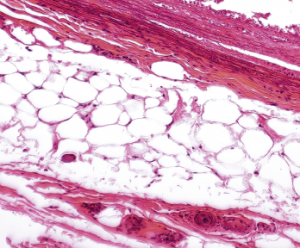
Kateryna Kon / shutterstock.com
AMSTERDAM—It’s been many years since adipose tissue came to be appreciated not just as a store of energy, but also as a regulator of metabolism and an important player in immune function. Rheumatology researchers continue to drill down into the role of fat cells in the search for mechanisms that could reveal targets for the treatment of rheumatic diseases, and experts shared recent findings in a session at EULAR: the Annual European Congress of Rheumatology.
Response to the Western Diet
Henk Schipper, MD, PhD, a pediatric cardiology fellow at University Medical Center Utrecht in The Netherlands who specializes in the study of adipose tissue, said the understanding of adipose tissue has continued to deepen over the past 30 years, with such milestones as the discovery of the hormone leptin and adipose tissue macrophages. The volume of work in the field has soared.
Recently, an international group of investigators found that mice on a high-fat, high-glucose Western diet showed a more aggressive response to stimulation with lipopolysaccharide (LPS) than control mice, but that this response was long lasting—seen again weeks after the mice were put back on a normal chow diet.1 This lasting response must mean the Western diet causes a fundamental change in the mice, the researchers say.

Dr. Schipper
“What they claim in this paper … is that there must be transcriptomic, epigenomic changes induced by the Western diet to really have long-lasting effects on the response of the immune cells,” Dr. Schipper said. “This is definitely something that’s also relevant for many rheumatoid disorders.”
Dr. Schipper said he is optimistic about the potential for therapeutic breakthroughs that can repair the “holes” that arise when the relationship between fat tissue and immune function is disrupted.
“There has been a huge increase in papers dealing with adipose-tissue immunology, adipose-tissue inflammation and immune-metabolism over the last few decades,” he said. “This is supposed to be the era of translation. Hopefully in the next few years we’ll see a lot of trials—and successful trials—to fix these holes in the co-evolution of adipose tissue and immunology.”
‘There must be transcriptomic, epigenomic changes induced by the Western diet to really have long-lasting effects on the response of the immune cells,’ Dr. Schipper said.
Adipokines
Silvia Bosello, MD, PhD, professor of rheumatology at the Catholic University of the Sacred Heart in Rome, presented findings on how adipokines—proteins produced by white adipose tissue that are involved with endothelial cell homeostasis and angiogenesis and that regulate the immune response and systemic inflammatory process—are reduced in systemic sclerosis (SSc).2
